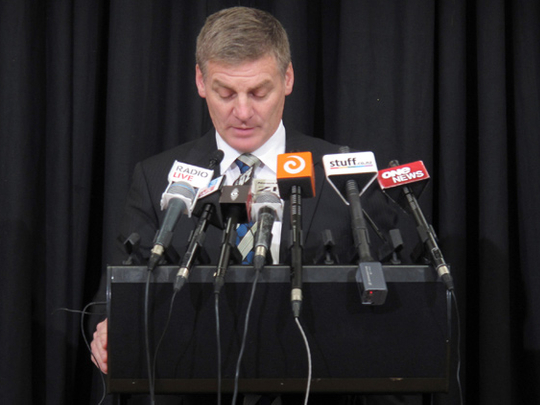
Wellington: New Zealand’s government charted a more optimistic economic outlook on Thursday as it raised its forecast for budget surpluses on the back of moderate growth, and said it would start spending more on new policies.
The centre-right National Party coalition government had delivered “zero budgets” for the past two years, with no new spending, as it battled a weak growth outlook and a slide in its tax take.
But Finance Minister Bill English said the economy has perked up, and government finances were on a sounder footing to allow new spending.
“This year there has been a bit more room to move in the budget,” English told reporters.
The deficit for the current year to June 30 was cut to 6.3 billion New Zealand dollars (Dh18.9 billion) from a previous NZ$7.3 billion forecast, but the forecast deficit for 2013/14 was held steady at NZ$2 billion.
The Treasury forecast a slightly bigger surplus in 2014/15, the long-standing date for a return to the black, of NZ$75 million ($62 million) from NZ$66 million forecast in last December’s mid-year update.
The Treasury revised up its growth for the year to March to 2.5 per cent from 2.3 per cent in the December update, but saw growth at 2.4 per cent in March 2014 from 2.9 per cent.
The department estimated the drought which hit the North Island in early 2013 would cost the economy about NZ$1.4 billion or 0.7 per cent of GDP.
However, the pick up in growth, driven by strong commodity prices and earthquake rebuilding in the Christchurch region, will see a gradual fall in borrowing over the next four years.
Government net debt is seen peaking at 28.7 per cent of GDP in 2014/15, from an earlier forecast of 29.5 per cent in the same year.
Financial market reaction was muted with the New Zealand dollar briefly lifting about 10 points before settling back to $0.8245, while interest rate futures held steady.
Credit rating safe
Ratings agencies Moody’s and Fitch reconfirmed their ratings.
“We view the announcement as encouraging because it continues to demonstrate the New Zealand government remains committed to fiscal consolidation,” said Art Woo, an analyst at Fitch, who said the double-A rating with stable outlook would be unaffected.
New Zealand relies heavily on offshore lenders to fill its budget gap and has repeatedly reaffirmed its surplus plan to defend its double-A credit ratings. Moody’s still rates New Zealand triple-A.
English also said that the overvalued New Zealand dollar continued to weigh on the economy, limiting export-driven growth, but the country was still outperforming most other developed economies.
In December, the government reiterated the need for spending controls and cut growth forecasts as the economy went through a soft patch.
But data this year has shown a lift in business and consumer confidence, moderate growth in retail sales, building consents, record house prices, strong commodity prices, and a fall in unemployment.
“This budget highlights how different New Zealand is to the rest of the developed world, which is mostly mired in fiscal austerity, while we have the luxury of arguing about putting a little bit more into education,” said Bank of New Zealand head of research Stephen Toplis.
English said NZ$900 million had been set aside for new spending in the coming fiscal year, against NZ$800 million originally planned.
However, spending growth in later years has been limited to NZ$1 billion a year from NZ$1.2 billion previously advised.
Missed opportunities
Opposition political parties and trade unions said the budget was a missed opportunity for action in key areas.
“There is nothing new in this Budget to address New Zealand’s high unemployment rate ... with unemployment forecast to still be at 6 percent next year,” said Bill Rosenberg, an economist with the Council of Trade Unions.
The budget showed increased spending on health and education, and a planned NZ$2.9 billion investment in new and refurbished houses by the state housing agency over the next four years.
English confirmed that the power company, Meridian Energy Ltd, valued at more than NZ$6 billion, would be the next state-owned corporation to be partially privatised, with up to 49 per cent to be sold in the second half of this year.
“Once again, National is relying on flogging off our assets to solve our economic problems,” said David Shearer, leader of the main opposition centre-left Labour Party.
Levies on individuals and businesses to fund the state accident insurance scheme were set to be reduced by as much as NZ$1.3 billion over the next two years.
English said the government would delay the resumption of payments of about NZ$2 billion a year to the state pension investment fund until net debt falls to 20 per cent of GDP, probably around 2021.
He confirmed that the government had formally agreed with the Reserve Bank or New Zealand a range of macro-prudential tools, such as capital buffers and loan to value ratios, to cope with a strong housing market or asset bubbles.












